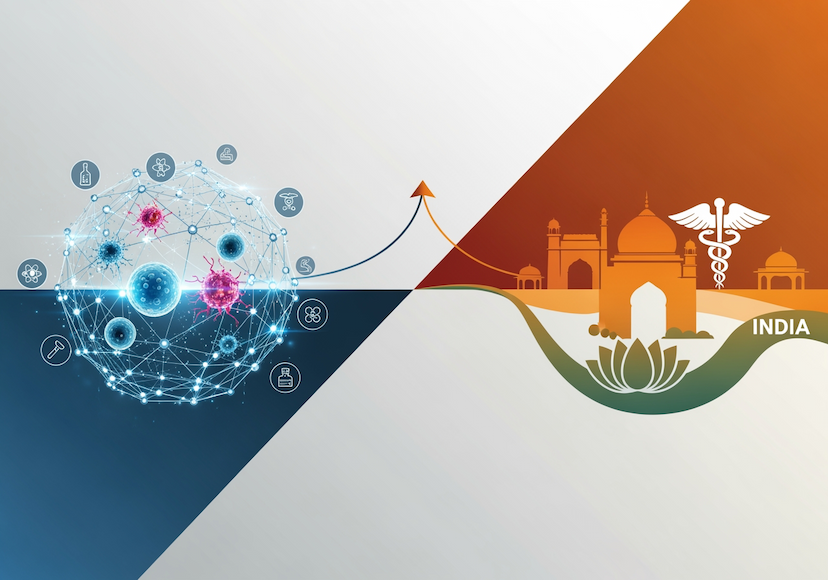
Success Rates of Cancer Treatment in India Compared to Other Countries
14 Nov, 2025
 Healthtrip
Healthtrip- Cancer Treatment Success Rates: An Overview
- Factors Influencing Cancer Treatment Outcomes
- Cancer Treatment in India: Success Rates and Availability
- Comparing Cancer Treatment Success Rates Globally: India vs. Other Countries
- Cost-Effective Cancer Treatment Options in India
- Success Stories and Examples of Cancer Treatment in India
- Conclusion: The Future of Cancer Treatment Success in India
Understanding Cancer Treatment Success Rates
Cancer treatment success rates are usually measured in several ways, including overall survival rate (the percentage of people who are still alive after a certain period, usually five years, after diagnosis), disease-free survival rate (the percentage of people who show no signs of cancer after treatment), and response rate (the percentage of people whose cancer shrinks or disappears after treatment). These rates provide a general picture, but it’s essential to remember that they don't predict individual outcomes. Every patient's journey is unique, influenced by the type and stage of cancer, their overall health, genetic and lifestyle factors and the specific treatment plan. For example, a patient undergoing treatment at Fortis Memorial Research Institute, Gurgaon, might experience different results than someone with the same diagnosis elsewhere, due to variations in treatment protocols or the availability of cutting-edge technologies. Understanding these nuances is crucial when interpreting statistics, which is why consulting with experienced oncologists, perhaps those accessible through Healthtrip's network, is so important. They can provide personalized insights and realistic expectations.
Most popular procedures in India
Cancer Treatment Landscape in India
India has emerged as a significant destination for cancer treatment, offering a blend of advanced medical technologies and skilled healthcare professionals at competitive costs. Hospitals like Max Healthcare Saket and Fortis Hospital, Noida, are equipped with state-of-the-art facilities, offering treatments from surgery and chemotherapy to radiation therapy and targeted therapies. The country has made remarkable progress in cancer research, with many Indian oncologists actively involved in clinical trials and pioneering new treatment approaches. The cost-effectiveness of treatment in India draws many international patients seeking quality care without breaking the bank. However, access to these advanced facilities and skilled specialists may be unevenly distributed across the country, with urban areas generally having better resources than rural regions. Furthermore, factors like late diagnosis, lack of awareness, and socioeconomic disparities can affect treatment outcomes. Despite these challenges, the healthcare system in India is continuously improving, with initiatives focused on early detection, improved access, and enhanced treatment protocols. Healthtrip aims to bridge these gaps by connecting patients with reputable hospitals and experienced doctors, ensuring that more people have access to the best possible care.
Wellness Treatments
Give yourself the time to relax
Lowest Prices Guaranteed!

Lowest Prices Guaranteed!
Comparing Success Rates: India vs. Other Countries
When comparing cancer treatment success rates, it's important to look at specific types of cancers and treatment modalities. For instance, the five-year survival rate for breast cancer in India is comparable to that of some developed countries. However, for certain other cancers, such as lung cancer, the survival rates might be lower due to factors like late diagnosis and differences in treatment patterns. Countries with well-established healthcare systems, like Singapore with hospitals like Singapore General Hospital and Mount Elizabeth Hospital, and the United Kingdom with facilities like Cleveland Clinic London, and The Royal Marsden Private Care, London, often report higher overall survival rates due to early detection programs, advanced technologies, and comprehensive healthcare infrastructure. However, these countries also come with significantly higher treatment costs, making India a viable alternative for many. What India provides is an increasingly sophisticated and accessible healthcare system, with leading institutions like Fortis Escorts Heart Institute offering advanced treatments at competitive prices. Platforms like Healthtrip play a vital role in helping patients weigh these factors, connecting them with the best treatment options that align with their medical needs and financial constraints.
Factors Influencing Success Rates
Multiple factors directly impact cancer treatment success rates, some of which are within our control, while others are not. Early diagnosis is a huge determinant; the earlier cancer is detected, the higher the likelihood of successful treatment. Access to quality healthcare, encompassing advanced medical technology, skilled healthcare professionals, and comprehensive support services, plays a crucial role. Treatment adherence, or the extent to which a patient follows the prescribed treatment plan, also significantly influences outcomes. Lifestyle factors, such as diet, exercise, and smoking habits, are also relevant. For example, a patient receiving treatment at Memorial Sisli Hospital might experience improved results if they adopt a healthier lifestyle alongside their medical interventions. Socioeconomic factors, like insurance coverage and financial stability, affect a patient's ability to access and afford necessary treatments. Additionally, individual biological factors, such as genetics, immune system strength, and the specific characteristics of the cancer, can influence how well a patient responds to treatment. Healthtrip understands these multifaceted factors and strives to connect patients with resources and support to improve their overall treatment journey, ensuring they receive holistic care that addresses both their medical and personal needs.
Latest Advancements in Cancer Treatment in India
India's cancer treatment landscape is rapidly evolving, fueled by advances in medical technology and research. Precision medicine, which uses genetic information to tailor treatment to individual patients, is gaining traction. Targeted therapies, designed to attack specific cancer cells while minimizing harm to healthy cells, are becoming more widely available. Immunotherapy, which harnesses the power of the body's immune system to fight cancer, is also showing promise. Minimally invasive surgical techniques, performed through small incisions, are reducing recovery times and improving patient outcomes. Radiation therapy is becoming more precise, with technologies like stereotactic body radiation therapy (SBRT) delivering high doses of radiation to tumors while sparing surrounding tissues. Hospitals such as Fortis Shalimar Bagh and Rajiv Gandhi Cancer Institute and Research Centre are at the forefront of these advancements, offering patients access to world-class treatments. Healthtrip is committed to staying abreast of these developments, ensuring that patients have access to the most up-to-date information and can make informed decisions about their care, connecting them to the relevant institutions and specialists that can provide these cutting-edge therapies.
Cancer Treatment Success Rates: An Overview
Navigating the world of cancer treatment can feel like wandering through a dense forest, especially when trying to understand success rates. What does "success" even mean in this context? Is it a complete cure, long-term remission, or simply extending life and improving quality of life? The answer, of course, depends on several factors including the type of cancer, its stage at diagnosis, the treatment approach, and the overall health of the patient. Broadly speaking, success rates are often presented as five-year survival rates, which indicate the percentage of people with a specific cancer who are still alive five years after diagnosis. These numbers, while helpful, paint a general picture and don't always reflect the individual journey. Imagine you're planning a trip, and someone tells you the average weather at your destination. It's useful information, but it doesn't guarantee sunshine every day! Similarly, cancer statistics provide a benchmark, but the reality for each patient can vary significantly. For instance, cancers like melanoma and breast cancer often have higher five-year survival rates when detected early, while others, like pancreatic cancer, tend to have lower rates due to late detection and aggressive progression. It's also vital to understand that these rates are constantly evolving as medical science advances and newer, more effective treatments become available. Healthtrip strives to keep you informed about these advancements, connecting you with the latest innovations and expert opinions to help you make informed decisions about your cancer care journey.
Consider this: success rates for certain cancers have dramatically increased over the past few decades thanks to breakthroughs in chemotherapy, radiation therapy, targeted therapies, and immunotherapy. These advancements mean that more people are living longer, healthier lives after a cancer diagnosis. However, it’s also crucial to recognize that statistics can sometimes be misleading. A high survival rate doesn't necessarily mean a complete absence of challenges. Patients may still experience side effects from treatment, require ongoing monitoring, or face the emotional and psychological toll of living with cancer. Therefore, a holistic approach that addresses not only the physical aspects of the disease but also the mental and emotional well-being of the patient is paramount. Healthtrip understands the importance of comprehensive care and collaborates with healthcare providers who prioritize the overall well-being of their patients. We aim to provide information and support that empowers you to navigate every step of your cancer journey, from diagnosis to treatment and beyond. Remember, you're not just a statistic; you're an individual with unique needs and aspirations, and we're here to help you find the best path forward.
Factors Influencing Cancer Treatment Outcomes
The landscape of cancer treatment is incredibly complex, with a multitude of factors influencing the eventual outcome. It’s not simply about the type of cancer you have; it's about understanding the intricate web of variables that can impact your individual journey. Think of it like baking a cake – you can have the same recipe, but the result might vary depending on the oven, the quality of ingredients, and even the humidity in the air! Similarly, factors like stage at diagnosis, tumor grade, genetics, access to quality healthcare, and lifestyle choices all play a significant role in determining the success of cancer treatment. Early detection, for instance, is often a game-changer. When cancer is caught at an early stage, before it has spread to other parts of the body, treatment options are typically more effective, and the chances of a positive outcome are higher. Regular screenings and awareness of potential symptoms are therefore crucial. Tumor grade, which refers to how abnormal the cancer cells look under a microscope, also provides valuable information about the cancer's aggressiveness and how likely it is to grow and spread rapidly. Genetic factors can also influence treatment response. Certain genetic mutations may make a cancer more or less susceptible to specific therapies, highlighting the importance of personalized medicine approaches that tailor treatment to the individual's unique genetic profile. Healthtrip recognizes the significance of these factors and aims to connect you with healthcare providers who are at the forefront of personalized cancer care.
Furthermore, your overall health and lifestyle choices can significantly impact your body's ability to withstand cancer treatment and recover effectively. Maintaining a healthy weight, eating a balanced diet, engaging in regular physical activity, and avoiding smoking and excessive alcohol consumption can all contribute to better treatment outcomes. These lifestyle factors can boost your immune system, reduce inflammation, and improve your overall resilience. Access to quality healthcare is another critical determinant of cancer treatment success. This includes having access to experienced oncologists, state-of-the-art diagnostic and treatment facilities, and comprehensive supportive care services. Geographic location, socioeconomic status, and insurance coverage can all influence access to these resources, creating disparities in cancer outcomes. Healthtrip is committed to bridging these gaps by providing information and resources that empower individuals to access the best possible cancer care, regardless of their location or circumstances. From connecting you with top hospitals like Fortis Shalimar Bagh, Max Healthcare Saket, and Fortis Memorial Research Institute, Gurgaon to providing information about cost-effective treatment options, we strive to make quality cancer care more accessible and equitable. Ultimately, understanding the interplay of these factors is key to navigating the complexities of cancer treatment and maximizing your chances of a positive outcome. Remember, you are an active participant in your care, and Healthtrip is here to support you every step of the way.
Cancer Treatment in India: Success Rates and Availability
India has emerged as a significant destination for cancer treatment, attracting patients from around the globe due to its combination of advanced medical technology, skilled oncologists, and relatively affordable costs. But what are the actual success rates for cancer treatment in India, and how readily available are the various treatment options? The answer, like anywhere else in the world, is nuanced and depends on the specific type of cancer, its stage, and the treatment protocols followed. However, several factors contribute to India's growing reputation as a hub for cancer care. Firstly, many Indian hospitals, such as Fortis Memorial Research Institute, Gurgaon, Max Healthcare Saket, and Apollo Hospitals, boast state-of-the-art facilities and equipment, including advanced imaging technologies like PET-CT scans and MRI, as well as sophisticated radiation therapy machines like LINACs and proton therapy. These technologies are crucial for accurate diagnosis, precise treatment planning, and effective delivery of radiation therapy. Secondly, India has a large pool of highly trained and experienced oncologists, surgeons, and radiation therapists who are experts in their respective fields. Many of these specialists have received training at leading medical institutions around the world and are actively involved in research and clinical trials, ensuring that they stay abreast of the latest advancements in cancer care. Healthtrip partners with these leading hospitals and doctors to provide you with access to world-class cancer treatment in India.
Furthermore, the availability of various cancer treatment options in India has expanded significantly in recent years. In addition to traditional treatments like surgery, chemotherapy, and radiation therapy, many hospitals now offer advanced therapies such as targeted therapy, immunotherapy, and bone marrow transplantation. Targeted therapy involves using drugs that specifically target cancer cells while minimizing damage to healthy cells, while immunotherapy harnesses the power of the immune system to fight cancer. Bone marrow transplantation is used to treat certain types of blood cancers, such as leukemia and lymphoma. While success rates vary depending on the specific cancer and treatment approach, studies have shown that Indian hospitals achieve comparable outcomes to those in developed countries for many types of cancer. This is particularly true for cancers like breast cancer, lung cancer, and leukemia, where survival rates have steadily improved over the past decade. However, it's also important to acknowledge that challenges remain. Access to quality cancer care can be unevenly distributed across the country, with patients in rural areas often facing difficulties in accessing timely diagnosis and treatment. Furthermore, the cost of cancer treatment can still be a barrier for some patients, despite being relatively affordable compared to developed countries. Healthtrip is working to address these challenges by providing information about affordable treatment options and connecting patients with hospitals that offer financial assistance programs. We believe that everyone deserves access to the best possible cancer care, and we are committed to making that a reality for our patients in India and around the world.
Also Read:
Comparing Cancer Treatment Success Rates Globally: India vs. Other Countries
When we talk about cancer treatment, it's not just about the availability of advanced technologies; it's also about how effective those treatments are. Globally, success rates vary significantly, and it all boils down to a cocktail of factors. Think about countries with robust healthcare systems, like the United States, the United Kingdom, and Germany. They often boast higher success rates due to early detection programs, cutting-edge treatments, and comprehensive post-treatment care. Hospitals like Cleveland Clinic London and Helios Klinikum Erfurt are known for their advanced oncology departments and research-driven approaches, contributing to better outcomes. However, these countries often come with a hefty price tag, making them less accessible for patients seeking affordable options.
In comparison, India presents a different picture. While some might assume success rates are lower due to resource constraints, that's not always the case. In reality, India has made significant strides in cancer care. Leading hospitals like Fortis Memorial Research Institute, Gurgaon and Max Healthcare Saket are equipped with state-of-the-art technology and staffed by highly skilled oncologists. India's success lies in its ability to provide high-quality treatment at a fraction of the cost compared to Western countries. Factors like later-stage diagnoses and access to specialized treatments in rural areas can impact overall statistics. However, for those who can access quality care in urban centers, the success rates are increasingly competitive. The key difference lies in cost-effectiveness, making India an attractive destination for medical tourists seeking cancer treatment without breaking the bank. For instance, facilities like Mount Elizabeth Hospital in Singapore and National Cancer Centre Singapore offer exceptional care, but at a significantly higher cost than comparable treatments in India. It’s a balancing act between access, affordability, and quality that shapes the global landscape of cancer treatment success rates.
Cost-Effective Cancer Treatment Options in India
One of the most compelling reasons why India is becoming a hotspot for cancer treatment is the sheer cost-effectiveness. When you're facing a life-altering diagnosis like cancer, the financial burden can be overwhelming on top of the emotional and physical toll. India offers a lifeline by providing world-class treatment at a fraction of the cost compared to developed nations. What makes this possible? A blend of factors contributes to the lower costs: lower labor costs, generic drug availability, and government initiatives that support healthcare affordability. For instance, a course of chemotherapy or radiation therapy that might cost tens of thousands of dollars in the US or Europe can often be obtained for a significantly reduced amount in India. Hospitals like Fortis Hospital, Noida and Max Healthcare Saket leverage these cost advantages to offer comprehensive cancer packages that include everything from diagnosis and treatment to post-operative care and rehabilitation.
But don't mistake affordability for a compromise on quality. Indian oncologists are highly trained, often having received their education and training in top institutions around the world. The hospitals are equipped with the latest technologies, including advanced imaging, robotic surgery, and precision radiation therapy. Moreover, the availability of generic medications helps in reducing the overall treatment expenses. Patients can access the same effective drugs at a much lower price point. This is an especially significant benefit for those requiring long-term treatment plans. Healthtrip plays a crucial role in connecting patients with these cost-effective options, providing detailed information on treatment packages, hospital facilities, and the expertise of medical professionals. Take, for example, the advanced radiation therapy available at hospitals in India versus QUIRONSALUD PROTON THERAPY CENTRE in Spain. While the technology may be similar, the cost difference can be substantial, making India a viable and attractive option for many. It's about finding the sweet spot where affordability meets high-quality medical care, and India is increasingly becoming a leader in this space.
Also Read:
Success Stories and Examples of Cancer Treatment in India
Behind every successful cancer treatment are stories of hope, resilience, and the unwavering dedication of medical professionals. In India, numerous patients have found a second chance at life through timely and effective cancer care. Imagine a patient diagnosed with stage III breast cancer. In a Western country, the treatment costs could run into hundreds of thousands of dollars, making it inaccessible for many. However, in India, the same patient could receive surgery, chemotherapy, and radiation therapy at a fraction of the cost at hospitals like Fortis Shalimar Bagh or Max Healthcare Saket. These success stories aren't just anecdotal; they're backed by comprehensive medical records and follow-up studies. Often, these hospitals adopt a multidisciplinary approach, bringing together surgeons, oncologists, radiation therapists, and supportive care staff to create tailored treatment plans.
Let's consider another example: a patient from Africa who traveled to India for a bone marrow transplant. The procedure, along with the necessary pre- and post-operative care, was significantly more affordable than in other global medical hubs. The transplant was successful, and the patient returned home with a renewed sense of hope and well-being. These stories underscore the impact of cost-effective, high-quality cancer treatment on individuals and families. Healthtrip facilitates these journeys by providing patients with access to verified information, personalized assistance, and seamless coordination of their medical travel. Moreover, hospitals in India are increasingly focusing on patient-centric care, offering not just medical treatment but also emotional and psychological support. This holistic approach plays a crucial role in improving treatment outcomes and enhancing the overall patient experience. For instance, facilities like Memorial Sisli Hospital in Turkey, may have similar oncological approaches, but the economic advantage often tilts towards India for many international patients. The confluence of skilled doctors, cutting-edge technology, and affordable pricing is creating a wave of success stories, solidifying India's position as a leading destination for cancer treatment.
Conclusion: The Future of Cancer Treatment Success in India
The trajectory of cancer treatment in India is undeniably upward. With each passing year, advancements in medical technology, increased investment in healthcare infrastructure, and the relentless pursuit of excellence by medical professionals are driving significant improvements in treatment success rates. India is not just becoming a cost-effective destination; it's emerging as a hub for innovation in cancer care. The future holds immense promise, with ongoing research focused on personalized medicine, targeted therapies, and early detection methods. Imagine a scenario where cancer can be diagnosed at its earliest stages, allowing for minimally invasive treatments and significantly improved survival rates. This is not just a dream; it's the direction in which Indian oncology is heading.
The role of organizations like Healthtrip is becoming increasingly vital in this evolving landscape. By providing patients with access to accurate information, facilitating seamless medical travel, and connecting them with the best healthcare providers, Healthtrip empowers individuals to make informed decisions about their treatment options. Moreover, the focus on holistic care, including mental health support and nutritional guidance, is gaining momentum, further enhancing the overall patient experience. While challenges remain, such as improving access to quality care in rural areas and addressing disparities in healthcare outcomes, the commitment to progress is unwavering. The future of cancer treatment success in India is bright, fueled by innovation, affordability, and a deep-seated dedication to saving lives. As technology continues to evolve and treatment options expand, India is poised to become a global leader in the fight against cancer, offering hope and healing to patients around the world. Similar progress can also be found in hospitals like Vejthani Hospital in Thailand, yet the economic models continue to favor India for many patients seeking high-quality, affordable care.
Also Read:
Related Blogs

Top Pre-Surgery Tests Required for Cancer Treatment
Explore evaluations, innovations, hospital comparisons, and global success insights for

Why India Leads in Affordable Cancer Treatment Analysis
Explore evaluations, innovations, hospital comparisons, and global success insights for

Patient Satisfaction Scores for Cancer Treatment at Healthtrip Partner Hospitals
Explore evaluations, innovations, hospital comparisons, and global success insights for

How to Choose the Right Hospital for Cancer Treatment Using Healthtrip's Criteria
Explore evaluations, innovations, hospital comparisons, and global success insights for

Latest Global Innovations in Cancer Treatment Now Available in India
Explore evaluations, innovations, hospital comparisons, and global success insights for

How Healthtrip Ensures Evidence-Based Care in Cancer Treatment
Explore evaluations, innovations, hospital comparisons, and global success insights for










